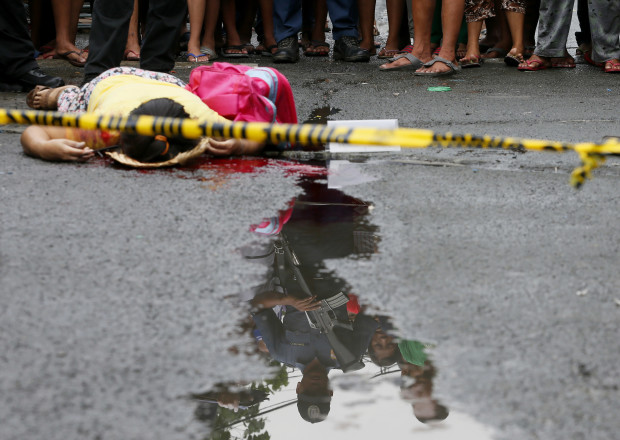Amnesty Int’l asks PH gov’t to hold PNP liable for ‘unlawful killings’ in drug war

Bystanders and a policeman looking at the body of a woman, later identified by her husband as that of Nora Acielo, still clutching the school bag of her child, are reflected in a pool of water after she was shot by still unidentified men while walking with her two children to school at a poor neighborhood in Manila, Philippines last December 8, 2016. Police said the killing of Acielo was the 13th recorded drug-related case in the past 24 hours in President Rodrigo Duterte’s unrelenting war on drugs. (Photo by BULLIT MARQUEZ/AP FILE PHOTO)
The Amnesty International (AI) has urged the Philippine government to hold the police accountable for the “unlawful killings” in the administration’s war against illegal drugs.
This, as the Philippine National Police (PNP) recoups its role in the controversial anti-narcotics campaign.
James Gomez, AI’s Director of Southeast Asia and the Pacific, said the police have “unlawfully killed thousands of people, the vast majority of them from poor and marginalized communities, in attacks so extensive and brutal they may well amount to crimes against humanity” since President Rodrigo Duterte assumed power.
“Now that police are once more returning to the forefront of anti-drug operations, the government must make sure that there is no repeat of the bloodshed seen during the past 18 months,” Gomez said in a statement on Tuesday.
INQUIRER.net is seeking the side of the PNP on this matter. The PNP has yet to respond, as of posting.
Article continues after this advertisementAccording to Gomez, “the police have been allowed to operate in a culture of almost total impunity” under the Duterte administration.
Article continues after this advertisement“It is a positive step by the Department of Justice to file murder charges against three police officers accused of killing Kian Loyd delos Santos, the teenager whose death is emblematic of the horrors of the ‘war on drugs.’ But independent investigations must cover each of the thousands of other unlawful killings, and all perpetrators, including those in positions of command, must be held to account,” he said.
PNP Director General Ronald “Bato” dela Rosa said on Monday that it could not guarantee that the fresh crackdown on illegal drugs would be bloodless, saying it was “impossible.”
READ: PNP chief vows to aim for less bloody war on drugs
“The fact that the national police chief himself has warned that this next phase of anti-drug operations may not be ‘bloodless’ highlights the need for vigilance. What the country needs is a public health-based drug policy that respects human rights, the rule of law and justice for the families of victims,” Gomez said.
“The Philippines neither can nor should try to solve its drug problems at gunpoint,” he added. /kga